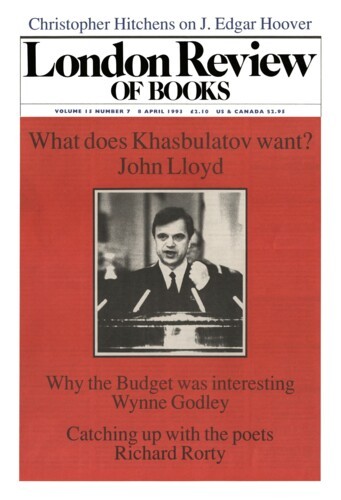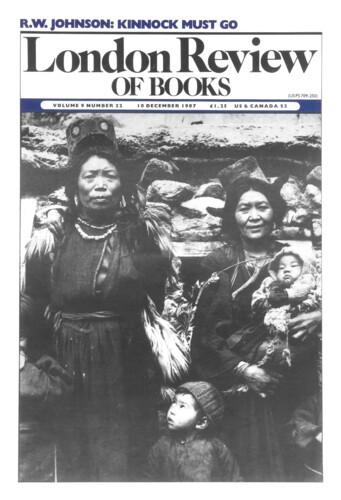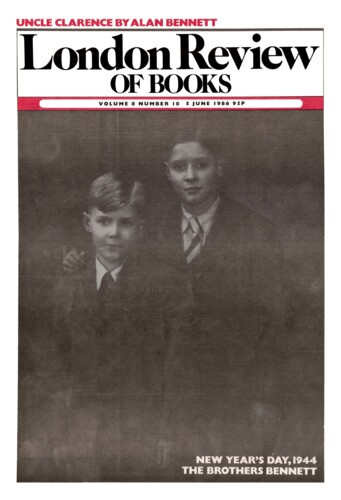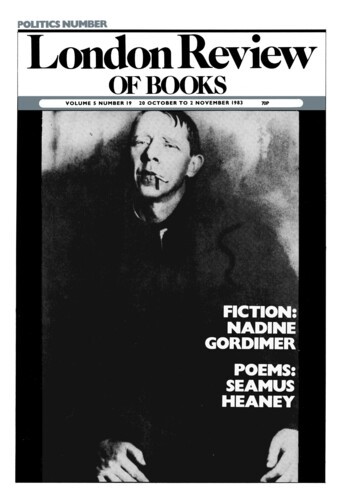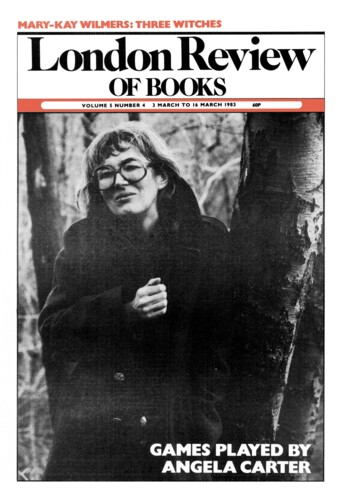D.G. Wright
D.G. Wright whose books include Democracy and Reform 1815-85 and Napoleon and Europe, is Principal Lecturer in history at Huddersfield Polytechnic.
Letter
In his perceptive review of Edward Said’s Culture and Imperialism (LRB, 8 April), W.J.T. Mitchell endorses Said’s remark that Jane Austen ‘in Mansfield Park sublimates the agonies of Caribbean existence to a mere half-dozen passing references to Antigua’. She offers rather more. In Chapter 21, when Edmund Bertram chides Fanny Price for being too passive towards her Uncle Thomas – the plantation-owner...
Letter
Swanker
10 December 1987
SIR: I much enjoyed Ronald Bryden’s review of Kathleen Tynan’s biography of her gifted and tragic husband (LRB, 10 December 1987). But he is surely mistaken in his remarks on Kenneth Tynan’s behaviour at Oxford. It may well be that the 1944 Education Act ‘opened Britain’s older universities’ to ‘a generation of grammar-school children’. But Tynan went to King Edward’s, Birmingham,...
Letter
Uncle Clarence
5 June 1986
SIR: I much enjoyed Alan Bennett’s evocative essay on his Uncle Clarence until the final paragraph, where he writes, ‘Nobody could say now why these men died,’ and refers to the Second World War as ‘the one with a purpose’. Now I always thought that the purpose of the Great War on the Western Front was clear enough: to shift the German Army from French and Belgian soil and, to quote my late...
Letter
Criminal Statistics
20 October 1983
SIR: The only significant point at issue between Mr Pearson (Letters, 1 December) and myself concerns his description in Hooligan of the Bristol riots: ‘when, after savage reprisals by the dragoons, 500 people were left dead during three days rioting in which prisoners were broken out from the lock-ups, buildings were burned, ransacked and looted and the Mansion House invaded’. While being well...
Letter
‘Nothing Sacred’
3 March 1983
SIR: In his extraordinarily pretentious review of Angela Carter’s book (LRB, 3 March), Tom Paulin exhorts her to develop her talent for documentary. Miss Carter’s description of Bradford prompts him to wax lyrical over ‘the new post-imperial sensibility singing its delighted sense of being free from all that pompous gruffness which goes with a concept of progress and national destiny.’ The...
Read anywhere with the London Review of Books app, available now from the App Store for Apple devices, Google Play for Android devices and Amazon for your Kindle Fire.
Sign up to our newsletter
For highlights from the latest issue, our archive and the blog, as well as news, events and exclusive promotions.
